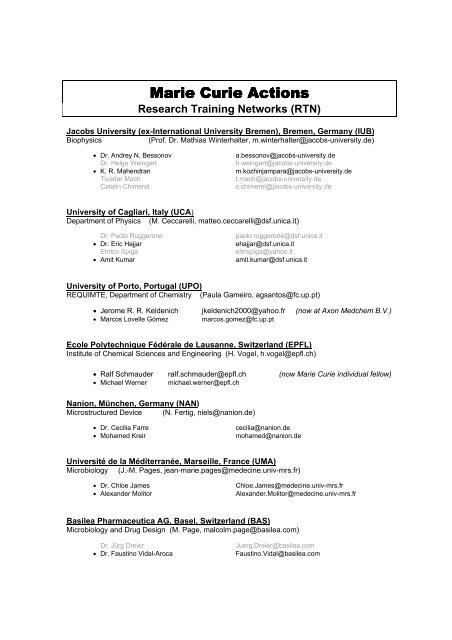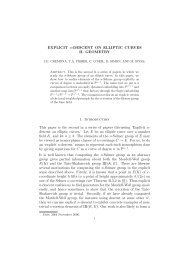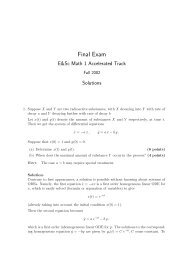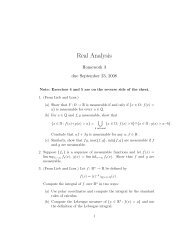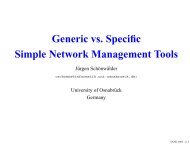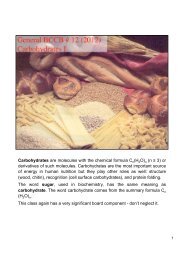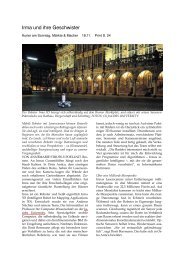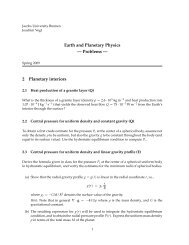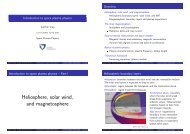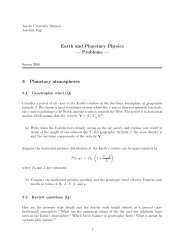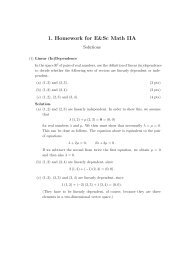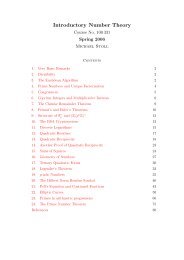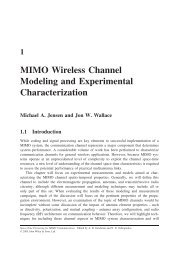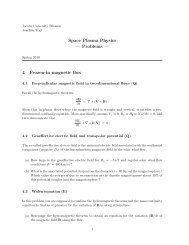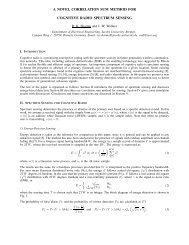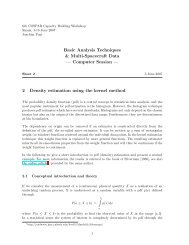Marie Curie Fellow - faculty.jacobs-university.de - Jacobs University
Marie Curie Fellow - faculty.jacobs-university.de - Jacobs University
Marie Curie Fellow - faculty.jacobs-university.de - Jacobs University
Create successful ePaper yourself
Turn your PDF publications into a flip-book with our unique Google optimized e-Paper software.
<strong>Marie</strong> <strong>Marie</strong> <strong>Curie</strong> <strong>Curie</strong> Actions Actions<br />
Actions<br />
Research Training Networks (RTN)<br />
<strong>Jacobs</strong> <strong>University</strong> (ex-International <strong>University</strong> Bremen), Bremen, Germany (IUB)<br />
Biophysics (Prof. Dr. Mathias Winterhalter, m.winterhalter@<strong>jacobs</strong>-<strong>university</strong>.<strong>de</strong>)<br />
• Dr. Andrey N. Bessonov a.bessonov@<strong>jacobs</strong>-<strong>university</strong>.<strong>de</strong><br />
Dr. Helge Weingart h.weingart@<strong>jacobs</strong>-<strong>university</strong>.<strong>de</strong><br />
• K. R. Mahendran m.kozhinjampara@<strong>jacobs</strong>-<strong>university</strong>.<strong>de</strong><br />
Tivadar Mach t.mach@<strong>jacobs</strong>-<strong>university</strong>.<strong>de</strong><br />
Catalin Chimerel c.chimerel@<strong>jacobs</strong>-<strong>university</strong>.<strong>de</strong><br />
<strong>University</strong> of Cagliari, Italy (UCA)<br />
Department of Physics (M. Ceccarelli, matteo.ceccarelli@dsf.unica.it)<br />
Dr. Paolo Ruggerone paolo.ruggerone@dsf.unica.it<br />
• Dr. Eric Hajjar ehajjar@dsf.unica.it<br />
Enrico Spiga enrispiga@yahoo.it<br />
• Amit Kumar amit.kumar@dsf.unica.it<br />
<strong>University</strong> of Porto, Portugal (UPO)<br />
REQUIMTE, Department of Chemistry (Paula Gameiro, agsantos@fc.up.pt)<br />
• Jerome R. R. Kel<strong>de</strong>nich jkel<strong>de</strong>nich2000@yahoo.fr (now at Axon Medchem B.V.)<br />
• Marcos Lovelle Gómez marcos.gomez@fc.up.pt<br />
Ecole Polytechnique Fédérale <strong>de</strong> Lausanne, Switzerland (EPFL)<br />
Institute of Chemical Sciences and Engineering (H. Vogel, h.vogel@epfl.ch)<br />
• Ralf Schmau<strong>de</strong>r ralf.schmau<strong>de</strong>r@epfl.ch (now <strong>Marie</strong> <strong>Curie</strong> individual fellow)<br />
• Michael Werner michael.werner@epfl.ch<br />
Nanion, München, Germany (NAN)<br />
Microstructured Device (N. Fertig, niels@nanion.<strong>de</strong>)<br />
• Dr. Cecilia Farre cecilia@nanion.<strong>de</strong><br />
• Mohamed Kreir mohamed@nanion.<strong>de</strong><br />
Université <strong>de</strong> la Méditerranée, Marseille, France (UMA)<br />
Microbiology (J.-M. Pages, jean-marie.pages@me<strong>de</strong>cine.univ-mrs.fr)<br />
• Dr. Chloe James Chloe.James@me<strong>de</strong>cine.univ-mrs.fr<br />
• Alexan<strong>de</strong>r Molitor Alexan<strong>de</strong>r.Molitor@me<strong>de</strong>cine.univ-mrs.fr<br />
Basilea Pharmaceutica AG, Basel, Switzerland (BAS)<br />
Microbiology and Drug Design (M. Page, malcolm.page@basilea.com)<br />
Dr. Jürg Dreier Juerg.Dreier@basilea.com<br />
• Dr. Faustino Vidal-Aroca Faustino.Vidal@basilea.com
Name:<br />
Institute:<br />
<strong>Jacobs</strong> <strong>University</strong> of Bremen<br />
(ex-International <strong>University</strong> Bremen)<br />
School of Engineering and Science<br />
Biophysics<br />
Bremen, Germany<br />
a.bessonov@<strong>jacobs</strong>-<strong>university</strong>.<strong>de</strong><br />
Expertise:<br />
Andrey N. Bessonov<br />
planar lipid bilayer technique, liposome swelling assay, electrochemical methods, modified<br />
electro<strong>de</strong>s technique, advanced PC user<br />
Short CV:<br />
Education:<br />
St. Petersburg Physico-Mathematical Lyceum №239 (Russia) – B.S. Diploma – 1998<br />
St. Petersburg State <strong>University</strong> (Russia) – M.S. Chemistry – 2003<br />
Institute of Cytology of Russian Aca<strong>de</strong>my of Science – Ph.D. in Biophysics& Cell Biology – 2006<br />
Professional Experience:<br />
Research Assistant, Institute of Cytology of RAS, St. Petersburg, Russia 2002 –�2007<br />
Research Associate, <strong>Jacobs</strong> <strong>University</strong>, Bremen, Germany 2007 – present<br />
Area of Interest: antimicrobial pepti<strong>de</strong>s, lipid bilayers, protein-lipid interaction, cytoskeletal proteins,<br />
antibiotic resistance, bacterial porins<br />
Your responsibility in the network:<br />
In collaboration with partner group from <strong>University</strong> of Porto by combining high sensitive<br />
electrophysiology methods with FRET technique we investigate transport of novel antibiotics<br />
through various bacterial porins. Experimental data are compared with microbiological assays and<br />
computer mo<strong>de</strong>ling results obtained in <strong>University</strong> of Marseille and <strong>University</strong> of Cagliari,<br />
correspondingly. Thus become possible to achieve the complete view of process and overcome the<br />
limitations of particular methods. Particular responsibility also inclu<strong>de</strong>s supervision of PhD stu<strong>de</strong>nt<br />
involved in the Project in <strong>Jacobs</strong> <strong>University</strong> and visiting stu<strong>de</strong>nts from partner groups.<br />
Your experience (positive/negative) with our network up to now:<br />
Positive
Name:<br />
Institute:<br />
<strong>Jacobs</strong> <strong>University</strong> of Bremen<br />
(ex-International <strong>University</strong> Bremen)<br />
School of Engineering and Science<br />
Biophysics<br />
Bremen, Germany<br />
m.kozhinjampara@<strong>jacobs</strong>-<strong>university</strong>.<strong>de</strong><br />
Expertise:<br />
Kozhinjampara Radhakrishnan Mahendran<br />
Planar lipid bilayer technique, liposome swelling assays, High resolution single channel recordings<br />
and analysis (pClamp software), Protein expression and purification. Antibiotic resistance, bacterial<br />
porins.<br />
Short CV:<br />
Educational Qualification:<br />
Pre-Degre, Covt Victoria College (India) 1998-2000 72%<br />
B.Sc Biotechnology, Bharathiar <strong>University</strong> (India) 2000-2003 85,2 %<br />
M.Sc Industrial Biotechnology, Bharathiar <strong>University</strong> (India) 2003-2005 85 %<br />
Research experience<br />
Summer Trainee, May-July, 2004, Genetic Transformation Laboratory, Sugarcane Breeding<br />
Institute (ICAR), Coimbatore.<br />
Project Trainee, INDIAN INSTITUTE OF SCIENCE, Bangalore<br />
Research asssistant, June 2005-November 2006, INDIAN INSTITUTE OF SCIENCE, Bangalore<br />
PhD Stu<strong>de</strong>nt, School of Engineering and science, <strong>Jacobs</strong> <strong>University</strong> Bremen, Germany December<br />
2006- Present<br />
Aca<strong>de</strong>mic Awards B.Sc., Biotechnology - Second rank (Silver Medal)<br />
M.Sc., Industrial Biotechnology-First rank (Gold Medal)<br />
Your responsibility in the network:<br />
Research work basically involves innovative science for the benefit of mankind. <strong>Fellow</strong>ship training<br />
period provi<strong>de</strong>s us with new research and professional contacts through which one can improve<br />
communication of scientific results. This also encourages in<strong>de</strong>pen<strong>de</strong>nt work and thinking. Topic of<br />
research increase chances of employment all over the world. Co-operation with team members are<br />
really excellent which helps learning new scientific techniques in my field of study. This programme<br />
also gives oppurtunitites to attend international conferences and seminar through which helps to<br />
un<strong>de</strong>rstand advances in the scientific field and also to establish new scientific collabrations. Our<br />
area of expertise is planar lipid bilayer electrophysiology and lab provi<strong>de</strong>s excellent experimental<br />
equipments and computer facilities for advanced research. Results obtained form our study can be<br />
combined with studies of our parter institutions which enables us to publish manuscripts efficiently. I<br />
am also training master stu<strong>de</strong>nts of the <strong>University</strong> for their Thesis work which helps to gain<br />
lea<strong>de</strong>rship qualitites.<br />
Your experience (positive/negative) with our network up to now: - see responsibilities
Name:<br />
Institute:<br />
SLACS & Department of Physics,<br />
<strong>University</strong> of Cagliari<br />
Citta<strong>de</strong>lla Universitaria S.P. Monserrato-Sestu Km 0.700<br />
09042 Monserrato (CA), Italy<br />
ehajjar@dsf.unica.it<br />
Expertise:<br />
Structural Bioinformatics, Molecular Mo<strong>de</strong>ling and Simulations.<br />
Short CV:<br />
Eric Hajjar<br />
Education<br />
2004- 11/2007 PhD at the chemistry <strong>de</strong>partment of the <strong>University</strong> of Bergen, Norway; entitled<br />
"Molecular Mo<strong>de</strong>ling of the substrate specificity and of the membrane anchoring<br />
Of Proteinase3".<br />
2002-2004 Master "Genome Analysis and Molecular Mo<strong>de</strong>ling"<br />
Université Paris7, Jussieu, Paris, France<br />
2001-2002 "Licence"; 3rd Year (equivalent to Bachelors <strong>de</strong>gree) in Bioinformatics<br />
Université Paris7, Jussieu, Paris, France<br />
1999-2001 1st and 2nd Year at <strong>university</strong>; <strong>de</strong>gree in Life Sciences option Bioinformatics<br />
Université Paris7, Jussieu, Paris, France<br />
Your responsibility in the network:<br />
PostDoc Position within the group; supervised by Matteo Ceccarelli (UCA).<br />
Your experience (positive/negative) with our network up to now:<br />
I have only been part of the network for few months. However I can tell I have a good feeling about<br />
this network, the scientific goals are very straightforward and “transparent”; the outcomes would<br />
benefit to both fundamental knowledge and applied products. The responsibility of each of the<br />
group is well <strong>de</strong>fined and overall I have confi<strong>de</strong>nce on the ability to achieve the goals.
Name:<br />
Institute:<br />
SLACS & Department of Physics,<br />
<strong>University</strong> of Cagliari<br />
Citta<strong>de</strong>lla Universitaria S.P. Monserrato-Sestu Km 0.700<br />
09042 Monserrato (CA), Italy<br />
Amit.kumarr@dsf.unica.it<br />
Expertise:<br />
Molecular Dynamics Simulations<br />
Short CV:<br />
Education :<br />
Masters of Science in Physics , Sathya Sai <strong>University</strong> , India 2004<br />
Research Experience :<br />
Junior Research fellow : Indian Institute of Technology (IIT) Bombay , India 2005<br />
Scientific Co-worker : Interdisciplinary Center for Scientific Computing (IWR) , <strong>University</strong> of<br />
Hei<strong>de</strong>lberg , Germany.<br />
Your responsibility in the network:<br />
Amit Kumar<br />
To provi<strong>de</strong> the microscopic <strong>de</strong>tails on interactions between the Antibiotic and the porin during<br />
Translocation process using Computer Simulations . In short to propose the possible reaction<br />
pathway for Antibiotic translocation with an effort to rationalise with experimental findings.<br />
Your experience (positive/negative) with our network up to now:<br />
I feel very happy and priveledged to be part of this network . This forms a perfect plaftorm to<br />
discuss the simulation results with the people expertised in state of art experimental technique. I am<br />
very happy that there is<br />
a good correlation in the work between the simulation performed by us and experiments performed<br />
by our partners in the network .
Name:<br />
Institute:<br />
REQUIMTE<br />
Department of Chemistry,<br />
<strong>University</strong> of Porto, Portugal (UPO)<br />
jkel<strong>de</strong>nich2000@yahoo.fr<br />
now at Axon Medchem B.V.<br />
l<br />
Expertise:<br />
Organic Chemistry, Spectroscopies<br />
Short CV:<br />
Jerome Rodolphe Raphael Kel<strong>de</strong>nich<br />
Aca<strong>de</strong>mic <strong>de</strong>grees:<br />
PhD in organic and macromolecular chemistry 2006<br />
Mastere in Drug Design 2004<br />
Dipl. Engineer (Master’s <strong>de</strong>gree) in Chemical Engineering and Biochemistry 2003<br />
Master’s <strong>de</strong>gree in Organic and Macromolecular Chemistry 2003<br />
Professionnal experience:<br />
PhD in partnership with Sanofi-Aventis<br />
Your responsibility in the network:<br />
-in charge of the studies of the interaction drug-OmpF inserted in liposomes<br />
-chemical modifications of the proteins for the fore-mentioned studies<br />
-AFM imaging of the system on mica surface<br />
Your experience (positive/negative) with our network up to now:<br />
Good ambience and nice human experience favoring the transfer of i<strong>de</strong>as and knowledge in a<br />
european network<br />
Coworking with outstanding institutions and scientists in a mo<strong>de</strong>rn useful and exciting field<br />
Multidisciplinary environment along the network encouraging the curiosity of the participants
Name:<br />
Institute:<br />
REQUIMTE<br />
Department of Chemistry,<br />
<strong>University</strong> of Porto, Portugal (UPO)<br />
marcos.gomez@fc.op.pt<br />
Expertise:<br />
Marcos Lovelle Gómez<br />
I don't think I am an expert in anything. I can say fluorescence spectroscopy, synthesis of ferrocene<br />
<strong>de</strong>rivatives, synthesis of nanoparticles, swelling assay? Don't really know. Just to complete this<br />
part.<br />
Short CV:<br />
Studies & work:<br />
Degree in Chemistry, Master Thesis in Cyclometalation and catalysis, research in the group of<br />
nanomaterials and magnetism NANOMAG (USC, Spain); PhD position (<strong>Marie</strong> <strong>Curie</strong> fellowship<br />
(Porto, Portugal).<br />
Lab training: IR, UV-VIS, LLE, HPLC, fluorescence spectroscopy, chromatography<br />
techniques: column and thin layer chromatography, Schlenk material, vacuum line, inert glove box,<br />
magnetometer SQUID, TGA (Thermogravimeter Analyzer), liposomes and proteoliposomes<br />
reconstitution.<br />
Computational knowledge: Dos , MS Word, MS Excel, MS Power Point, Mestre C, CS<br />
ChemDraw 9.0, Origin 6.1, PCPDFWIN, WinFit, Chekcell, APD, Hyperquad.<br />
Language skills: Spanish, Galego, English, Portuguese.<br />
Publications: Magnetocaloric effect and size-<strong>de</strong>pen<strong>de</strong>nt study of the magnetic properties of<br />
cobalt ferrite nanoparticles prepared by solvothermal synthesis (reference number JOT 4475 for<br />
TNT 2007 "Trends in Nanotechnology")<br />
Your responsibility in the network:<br />
PhD position (<strong>Marie</strong> <strong>Curie</strong> fellowship), Dr. Paula Gameiro: Studies of the interactions between<br />
different cephalosporins and the bacterial outer membrane protein F<br />
Your experience (positive/negative) with our network up to now:<br />
The experience has been essentially positive. I've had the opportunity to meet and work with other<br />
members of the net on a new subject in a new field. This kind of environment encourages me in my<br />
choice of career so I am grateful for that. Moreover, I had the opportunity to travel to different<br />
places and get in contact with new scientific areas.<br />
Life outsi<strong>de</strong> the laboratory is a motivational factor as well, and this is one of the negative parts of<br />
being abroad since people are not usually open to foreigners. I am not saying that the net itself has<br />
to take care of the scientists when it comes to their social life, but some sort of integration policy<br />
should be foreseen. Language courses, enhance synergy with local groups... that kind of things.
Name:<br />
Institute:<br />
Ecole Polytechnique<br />
Fédérale <strong>de</strong> Lausanne<br />
EPFL<br />
Schwitzerland<br />
ralf.schmau<strong>de</strong>r@epfl.ch<br />
(now <strong>Marie</strong> <strong>Curie</strong> individual fellow)<br />
Expertise:<br />
FCS / single molecule Spectroscopy / FRET / electrical impedance spectroscopy<br />
Short CV:<br />
Ralf Schmau<strong>de</strong>r<br />
1994-1998 Biochemistry study, <strong>University</strong> of Potsdam (D)/ master thesis Rockefeller<br />
/NY/USA on RNA splicing<br />
1998-1999 Antibiotics lab, Riken Institute, Wako-shi /Japan<br />
1999-2001 Fraunhofer IBMT /Potsdam (D)<br />
2001-2005 PhD in Biophysics, Lei<strong>de</strong>n <strong>University</strong> / The Netherlands on FRET and FCS in<br />
biochemistry & biophysics<br />
2005-2006 Postdoc in Biophysics, Lei<strong>de</strong>n <strong>University</strong><br />
2006- Postdoc at the EPFL / Lausanne (CH), 11 month RTN, else EIF "crow<strong>de</strong>d<br />
membranes"<br />
Your responsibility in the network:<br />
Implementing a electrical impedance spectroscopy assay, <strong>de</strong>veloping an (semi-)automated assay.<br />
New direction: fluorescent assay.<br />
Your experience (positive/negative) with our network up to now:<br />
My experience was short (11 month), due to the funding of my own project. The ineraction with<br />
IUB/JUB was good, e.g. fast and uncomplicated access to a sample (OmpF), and fast help with<br />
protocols. There was little interaction with the other groups outsi<strong>de</strong> the meeting, possible due to<br />
time limitations or less scientific overlap. I had lots of interesting discussions on the first<br />
summerschool in Bremen, as well as during the meeting at the EPFL.<br />
Due to problems with EIS electro<strong>de</strong>s with DC-offset and my project change I could not use the full<br />
potential of the network .<br />
Negative experiences were only in the RTN treatment by the local<br />
administration(e.g.salary) and the failed atempt to get a gene from a group (involved in a competing<br />
RTN-network.).
Name:<br />
Institute:<br />
Ecole Polytechnique<br />
Fédérale <strong>de</strong> Lausanne<br />
EPFL<br />
Laboratory of Physical Chemistry<br />
of Polymers and Membranes (LCPPM),<br />
Schwitzerland<br />
Michael.werner@epfl.ch<br />
Expertise:<br />
Michael Werner<br />
Optical Trapping, Fluorescence Microscopy/Spectroscopy, Fluorescence Lifetime Imaging<br />
Microscopy (FLIM)<br />
Short CV:<br />
Since 03/2007 PhD stu<strong>de</strong>nt at the LCPPM (EPFL)<br />
Supervisor: Prof. Horst Vogel<br />
2001-2007 <strong>University</strong> of Saarbrücken, Germany and<br />
European School of Chemistry, Polymers and Materials<br />
Science, Strasbourg, France<br />
Studies in Chemistry and Materials Science completed<br />
by <strong>de</strong>grees "Chemie-Diplom" and "diplôme d'ingénieur<br />
01/2006 - 04/2006 Research assistant at the <strong>University</strong> of Saarbrücken,<br />
Germany in the group of Prof. Gregor Jung<br />
07/2005 - 10/2005 visiting stu<strong>de</strong>nt at the <strong>University</strong> of Melbourne,<br />
Australia in the group of Prof. Paul Mulvaney<br />
Your responsibility in the network:<br />
Early stage researcher (ESR) research field: <strong>de</strong>velopment of an experimental platform enabling<br />
screening and sorting on a single cell level<br />
Your experience (positive/negative) with our network up to now:<br />
as the Marseille meeting will be the first interaction with the network for me, I cannot say anything<br />
about my experience with it so far
Name:<br />
Institute:<br />
Nanion Technologies GmbH<br />
Microstructured Device (N.Fertig)<br />
München, Germany<br />
Cecilia@nanion.<strong>de</strong><br />
Expertise:<br />
Electrophysiology, patch clamp, planar patch clamping, electroporation<br />
Short CV:<br />
Janny Cecilia Isabel Farre<br />
Education:<br />
1997 – 2001 Ph.D. Analytical chemistry / Electrophysiology, Göteborg <strong>University</strong>, Swe<strong>de</strong>n<br />
1992 – 1996 Master of Science, Organic chemistry, Göteborg <strong>University</strong>, Swe<strong>de</strong>n<br />
1989 – 1992 Swedish gymnasium, Science, Jönköping, Swe<strong>de</strong>n<br />
Employments:<br />
2006 – Present Nanion technologies , München, Germany<br />
2005 Department of Biophysics, Göteborg <strong>University</strong>, Göteborg, Swe<strong>de</strong>n<br />
2002-2005 Cellectricon AB, Göteborg, Swe<strong>de</strong>n<br />
1997 Lecturer in organic chemistry, Karlstad <strong>University</strong>, Karlstad, Swe<strong>de</strong>n<br />
Your responsibility in the network:<br />
Automation of bilayer recordings.<br />
Your experience (positive/negative) with our network up to now:<br />
The network offers access to expertise in many fields important to the project. Nanion, on the other<br />
hand, offers <strong>de</strong>vices and expertise for planar electrophysiology and chip based bilayer recrodings.<br />
The collaboration has been very fruitful in terms of the achieved experiemental results and<br />
experiences, and how these can be applied to porin and other research.
Name:<br />
Institute:<br />
Nanion Technologies GmbH<br />
Microstructured Device (N.Fertig)<br />
München, Germany<br />
Mohamed@nanion.<strong>de</strong><br />
Expertise:<br />
Electrophysiologist, Cell biologist<br />
Short CV:<br />
Work experience:<br />
Mohamed Kreir<br />
Research trainee: Institut <strong>de</strong> Recherche PIERRE-FABRE (Castres, France)<br />
Division of Cardiovascular Diseases II Mission: Optimisation and<br />
validation of automated patch clamp set-up.<br />
Research trainee: IFR 53 (Faculty of Pharmacy, Reims, France)<br />
Mission: Realization of state of the art on “Clinical research and cells therapies”.<br />
Research trainee: Laboratory of immunology (Faculty of Medicine, Reims, France)<br />
Mission: Study on immunological dysfunction responsible of « choriorétinopathie <strong>de</strong><br />
Birdshot ».<br />
Research trainee: CNRS UMR 6142 (Faculty of Pharmacy, Reims, France)<br />
Mission: New method of three-dimensional cell culture <strong>de</strong>dicated to the study<br />
of three tumoral cells lines<br />
Education:<br />
Mater Professional Biotechnologies: Engineering and Therapeutics Strategie<br />
Maitrise <strong>de</strong> Biologie cellulaire et physiologie animale<br />
Your responsibility in the network:<br />
Improve and allow the high throughput screening application on lipid bilayers using chip based<br />
technology and microfluidics systems.<br />
Your experience (positive/negative) with our network up to now:<br />
More knowledge in Biophysics (electroformation, microfluidics, support for the recordings…).
Name:<br />
Institute:<br />
Université <strong>de</strong> la Méditerranée<br />
Microbiology<br />
Aix-en-Marseille<br />
UMR-MD 1<br />
Enveloppe bacterienne, perméabilité et antibiotique<br />
Maseille, France<br />
Chloe.James@me<strong>de</strong>cine.univ-mrs.fr<br />
Expertise:<br />
Postdoc specialising in Molecular Microbiology<br />
Short CV:<br />
Dr. Chloé Elizabeth James<br />
2003-2006: Post Doctoral Researcher at the <strong>University</strong> of Florida, Dept of Oral Biology:<br />
employed by Prof Richard Lamont. Fun<strong>de</strong>d by The National Institute of Health (NIH)<br />
Project: Investigation of the pathophysiology of the oral pathogens. I used molecular techniques<br />
(genetic manipulation, real-time PCR, microarray analysis and protein purification) to study gene<br />
expression effected by cell-cell signalling and interactions between P. gingivalis and S. gordonii.<br />
2001-2002: Post Doctoral Researcher at the <strong>University</strong> of Liverpool, School of Biol Sci:<br />
employed by Prof. Alan McCarthy. Fun<strong>de</strong>d by The Biotechnology and Biological Science Research<br />
Council (BBSRC).<br />
Project: Molecular characterisation of verotoxigenic bacteriophage infection. I used molecular<br />
techniques to investigate bacteriophage immunity and a host receptor protein for the bacteriophage<br />
attachment and infection.<br />
1998 - 2001: PhD Stu<strong>de</strong>ntship at the <strong>University</strong> of Liverpool, School Biological Sciences:<br />
Supervisors: Profs J.R. Saun<strong>de</strong>rs, A.J. McCarthy and R. Sharp. Fun<strong>de</strong>d by The Ministry of<br />
Agriculture Fisheries and Food (MAFF) / Centre for Applied Microbiological Research (CAMR).<br />
Title: “Use of a Recombinant Verocytotoxigenic Phage to Investigate Infection of Bacterial Hosts”<br />
Your responsibility in the network:<br />
Post Doctoral Researcher July 2006- July 2008<br />
Employed by Prof Jean-<strong>Marie</strong> Pages<br />
Project: Investigation of the transport of antibiotics across the outer membrane of multi-drug<br />
resistant Gram negative bacteria. Use of molecular techniques including genetic manipulation and<br />
protein purification to investigate the role of outer membrane porins of E. coli and E. aerogenes and<br />
their regulation.<br />
Your experience (positive/negative) with our network up to now:<br />
I have enjoyed working on a very interesting project that has taught me new techniques and introduced<br />
me to other disciplines and ways of thinking. The network is well linked and we have a strong interactive<br />
relationship, particularly with Bremen. I have conversed extensively with researchers of the <strong>Jacobs</strong><br />
<strong>University</strong> team via email and in person.
Name:<br />
Institute:<br />
Université <strong>de</strong> la Méditerranée<br />
Microbiology<br />
Aix-en-Marseille<br />
UMR-MD 1<br />
Enveloppe bacterienne, perméabilité et antibiotique<br />
Maseille, France<br />
Alexan<strong>de</strong>r.Molitor@me<strong>de</strong>cine.univ-mrs.fr<br />
Expertise:<br />
Alexan<strong>de</strong>r Molitor<br />
Doctoral thesis: `Régulation <strong>de</strong> la perméabilité membranaire chez les bactéries à Gram négatif et la<br />
relation avec la sensibilité aux antibiotiques´ (`Regulation of membrane permeability at gram<br />
negative bacteria and the relation to antibiotic resistnace`)<br />
Short CV:<br />
Since 01/2007 Doctoral thesis<br />
09/2005 - 07/2006 Diploma thesis ´In vitro analysis of interactions between toxins and<br />
binding proteins´ at the <strong>de</strong>partment of biotechnology at the<br />
Biozentrum, Würzburg<br />
07/2005 Diploma examination of biology in Biochemistry, Biotechnology,<br />
Microbiology<br />
Date of birth: 16 th August 1979<br />
Publications: `Membrane permeability and regulation of drug « influx and efflux » in<br />
enterobacterial pathogens` - Anne Davin-Regli, Jean-Michel Bolla, Chloë<br />
James, Jean-Philippe Lavigne, Jacqueline Chevalier, Eric Garnotel,<br />
Alexan<strong>de</strong>r Molitor, Jean-<strong>Marie</strong> Pagès<br />
Your responsibility in the network:<br />
Genetic regulation of membrane permeability (consistent of influx and efflux) in E. aerogenes.<br />
Special attention drawn to the ram-regulator gene only present in K. pneumoniae, Salmonella, E.<br />
cloaceae and E. aerogenes.<br />
Your experience (positive/negative) with our network up to now:<br />
At the moment I only have ma<strong>de</strong> good experiences with the <strong>Marie</strong> <strong>Curie</strong> Research Training<br />
Network. As far as I can say, the networking between the different groups works quite well. There is<br />
a vast exchange of information and knowledge. In my opinion, the most interesting part is to have<br />
the possibility to contact experts in several different fields, e.g. such as microbiologists and<br />
physicists. In my personal researches, it is very good to have the oppurtunity to work in a close<br />
network between microbiology, pharmacy and me<strong>de</strong>cine. So I think this strong connection of<br />
different fields of research also helps PhD-stu<strong>de</strong>nts like me, to get new points of view and new<br />
i<strong>de</strong>as on their own work.
Name:<br />
Institute:<br />
Basilea Pharmaceutica International Ltd.<br />
Microbiology and Drug Design<br />
Basel, Switzerland<br />
(BAS)<br />
Faustino.Vidal@basilea.com<br />
Expertise:<br />
Biochemistry and Molecular Biology<br />
Short CV:<br />
Faustino Vidal-Aroca<br />
I have completed my Biology studies obtaining the Ph.D. <strong>de</strong>gree in Biology at the Department of<br />
Biochemistry and Molecular Biology I, Universidad Complutense <strong>de</strong> Madrid (Spain). During my<br />
career I have <strong>de</strong>veloped a wi<strong>de</strong> scientific background in Molecular Biology, Genetics, Microbiology<br />
and Biochemistry. Moreover, I am co-inventor in two patent applications: one <strong>de</strong>scribes a method to<br />
monitor in vivo gene expression in a broad range of organisms and the other <strong>de</strong>als with<br />
macromolecule extraction in high-throughput procedures. Finally, I have experience in working on<br />
different systems like bacteria, yeast and mammalian cells. My two most recent positions are<br />
working on "Genome Wi<strong>de</strong> I<strong>de</strong>ntification of Target Genes for the Design of Non-Conventional<br />
Antibiotics against Cystic Fibrosis Related Pathogens" at the Milan <strong>University</strong> and currently<br />
“Antibiotic Translocation Studies in Gram-negative Bacteria” at Basilea Pharmaceutica<br />
International.<br />
Your responsibility in the network:<br />
In this period I have i) planned and managed my project, ii) collaborated with other partners, iii)<br />
supervised a stu<strong>de</strong>nt from the network and iv) informed the entire consortium regarding the result<br />
progress and the planning of new interactions.<br />
Your experience (positive/negative) with our network up to now:<br />
Actually, we are working in synergy with the Consortium’s members. Our interaction is<br />
characterized by a fluent exchange of i<strong>de</strong>as and suggestions to resolve technical problems and with<br />
the common interest to conclu<strong>de</strong> the project with the most quantity and quality of results. Thus, the<br />
wi<strong>de</strong> formation in the network allows me to get in contact with a large number of experts in the field,<br />
to improve my scientific CV and to achieve qualities like team spirit, responsibility, flexibility, energy<br />
and drive.


